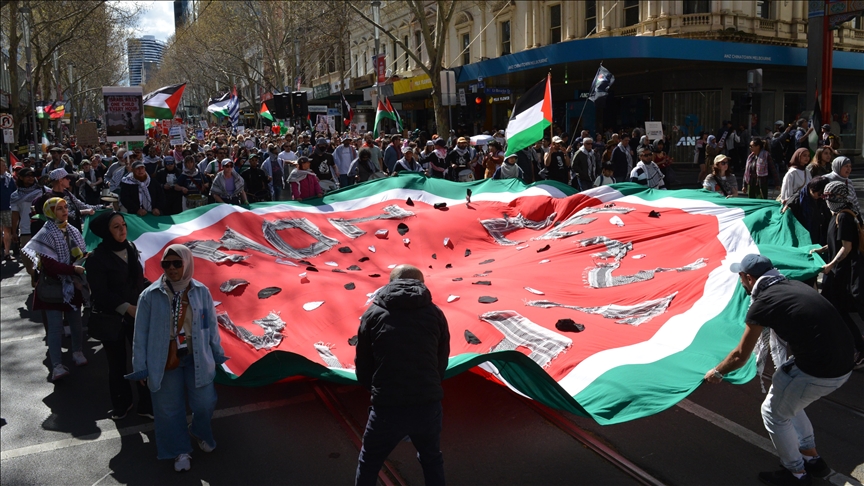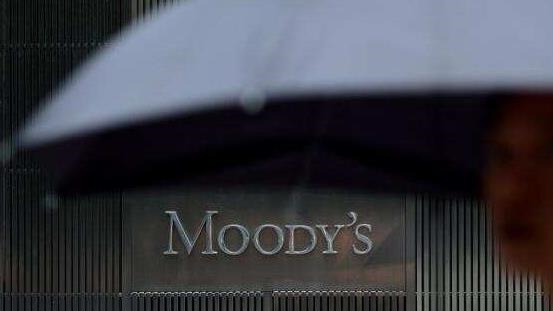How pro-Palestine sentiment surged in Australia and New Zealand
- ‘Australians are bitterly disappointed that their government has not done more to prevent these atrocities and to hold Israel accountable, so they have taken to the streets in protest in huge numbers,’ says UN special rapporteur Ben Saul
- New Zealand’s reluctance to recognize Palestine stems in part from a desire to maintain close ties with the US, says geopolitical analyst Geoffrey Miller
ISTANBUL
Just two years ago, Australia and New Zealand were considered firm supporters of Israel.
But that backing has eroded under the weight of relentless images from Gaza, mounting public outcry, and growing calls for justice. Now, both nations find themselves at a crossroads – caught between diplomatic caution and a public demanding accountability.
In Australia, massive pro-Palestinian demonstrations have reshaped the political conversation. The largest of these – the March for Humanity rally in August – saw tens of thousands take to the streets, demanding an end to Israel’s genocide in Gaza. The pressure pushed Canberra to recognize the state of Palestine, marking a significant – though largely symbolic – shift in policy.
New Zealand, however, has been more hesitant. While public sentiment has also grown louder, Wellington stopped short of following Australia’s lead. Its foreign minister later confirmed at the UN that the country would not extend recognition – at least for now.
Ben Saul, an Australian academic currently serving as the UN special rapporteur on human rights and counter-terrorism, told Anadolu that protests in Australia have grown “stronger over time as the tragedy in Gaza has worsened.”
A July survey found that 45% of Australians supported recognition of Palestine, up from 35% in May 2024 – a notable shift in public opinion.
Saul added that Australia only recognized Palestine after three-quarters of the world had already done so.
Still, he acknowledged that Canberra’s move was a step in the right direction.
“It is symbolically important in protecting the Palestinian right of self-determination,” added Saul, who is also the Challis Chair of International Law at the University of Sydney.
The decision, he said, “isolates and heaps pressure on Israel and the US, and it opens up the possibility of mutually beneficial diplomatic, trade and other relations between Australia and Palestine.”
Canberra’s announcement drew a sharp rebuke from Tel Aviv, but Australia doubled down, urging Israel to end the humanitarian disaster in Gaza.
New Zealand holds back, triggers backlash
Thousands of New Zealanders have staged regular demonstrations, with Auckland emerging as a hub of the pro-Palestine movement. Polls show nearly half of Kiwis support recognition of a Palestinian state, and a majority have backed a ceasefire since 2023, according to geopolitical analyst Geoffrey Miller.
“As elsewhere, the horrific nature of the war in Gaza, including the deteriorating humanitarian situation and mounting civilian death toll, forms the backdrop to growing support for the Palestinian cause in Australia and New Zealand,” Miller told Anadolu.
Israeli attacks over the past two years have killed more than 67,000 Palestinians in Gaza, most of them women and children, and wounded nearly 170,000 others, according to figures from Palestinian authorities.
A UN independent international commission of inquiry concluded last month that Israel is committing genocide in the enclave, where its siege and blockade on all essentials has also triggered a famine that has killed more than 460 Palestinians, including over 150 children.
Miller said New Zealand’s reluctance to recognize Palestine stems in part from a desire to maintain close ties with the US.
Foreign Minister Winston Peters, he noted, “is keen to bring New Zealand closer to the US and stay on good terms with the Donald Trump administration.”
Domestic politics also shaped the response.
Prime Minister Christopher Luxon’s coalition includes Peters’ populist New Zealand First party and the right-wing ACT party, led by David Seymour. Peters told the UN General Assembly last month that the Cabinet had declined to recognize Palestine – a position backed by Seymour’s more pro-Israel party, according to Miller.
The refusal triggered widespread criticism. Former Prime Minister Helen Clark called it a “day of shame,” while opposition Labour leader Chris Hipkins said the move was “morally reprehensible” and placed New Zealand on “the wrong side of history.”
Luxon defended the decision, saying it was one New Zealanders could be “proud” of – though he has previously criticized Israeli Prime Minister Benjamin Netanyahu for having “gone too far” in Gaza and said he had “lost the plot.”
Greens leader Chloe Swarbrick, who was suspended from Parliament during a debate on a bill seeking sanctions against Israel, blasted the government for refusing to join like-minded nations in recognizing Palestine.
When presenting her bill earlier this year, Swarbrick told lawmakers that “six of 68 government MPs with a spine” were needed “to stand on the right side of history.”
“The responses suggest that New Zealand’s stance towards the Palestinian issue and the war in Gaza may split down partisan lines – ending the previously more unified approach among parliamentarians,” said Miller.
Is recognizing Palestine statehood enough?
Saul said Australia must go further than symbolic recognition and take meaningful action: supporting the International Criminal Court’s investigation, suspending arms exports, sanctioning illegal Israeli settlements, and probing dual nationals fighting for Israel.
“Many Australians are not satisfied that the government has done enough,” he said.
Even after recognizing Palestinian statehood, Canberra has yet to impose “any meaningful sanctions on the Israeli political and military leaders responsible for the violence in Gaza.”
Australia has also been accused of allegedly concealing details of its involvement in the supply chain that Tel Aviv uses to maintain its F-35 fighter jets.
Australia has “a legal obligation under the (UN) Arms Trade Treaty not to export components likely to be used in violations of humanitarian law – or where there’s an overriding risk of such use,” he said.
The country is also prohibited under international law from exporting weapons parts to third countries, such as the US, which could then be transferred to Israel, he added.
Many dual Israeli-Australian nationals have also fought in Gaza, another area where the government could take decisive action.
Saul called for a comprehensive peace plan rooted in international law, “including an end to occupation, respect for self-determination and independent statehood, and Palestinian security from any future Israeli aggression.”
On the humanitarian front, he urged Prime Minister Anthony Albanese’s government to increase aid and commit to post-war reconstruction.
In Wellington, Miller noted that New Zealand has imposed travel bans on Israeli far-right ministers Bezalel Smotrich and Itamar Ben-Gvir, but lacks the legal tools for broader sanctions.
‘Australians are bitterly disappointed’
Saul said the ruling Australian Labor government’s recognition of Palestine signals a “more independent foreign policy” – even in the face of US resistance.
Australia and New Zealand are part of the Five Eyes intelligence-sharing alliance with the US, UK, and Canada.
The US remains Canberra’s closest security partner, “so maintaining that relationship has been a factor influencing Australia’s position on Palestine,” said Saul.
But domestic frustration is rising, he warned.
“Australians are bitterly disappointed that their government has not done more to prevent these atrocities and to hold Israel accountable, so they have taken to the streets in protest in huge numbers,” said Saul.
Ever since Israel launched its genocidal war on Gaza, Australia has also seen a sharp rise in Islamophobic incidents – including physical assaults, verbal harassment, and rape threats – which have more than doubled in the past two years.
“The Australian government has strongly condemned all racist attacks connected with the conflict, including Islamophobia and antisemitism,” said Saul. “These are fringe elements and do not represent the views of most Australians.”
Anadolu Agency website contains only a portion of the news stories offered to subscribers in the AA News Broadcasting System (HAS), and in summarized form. Please contact us for subscription options.


